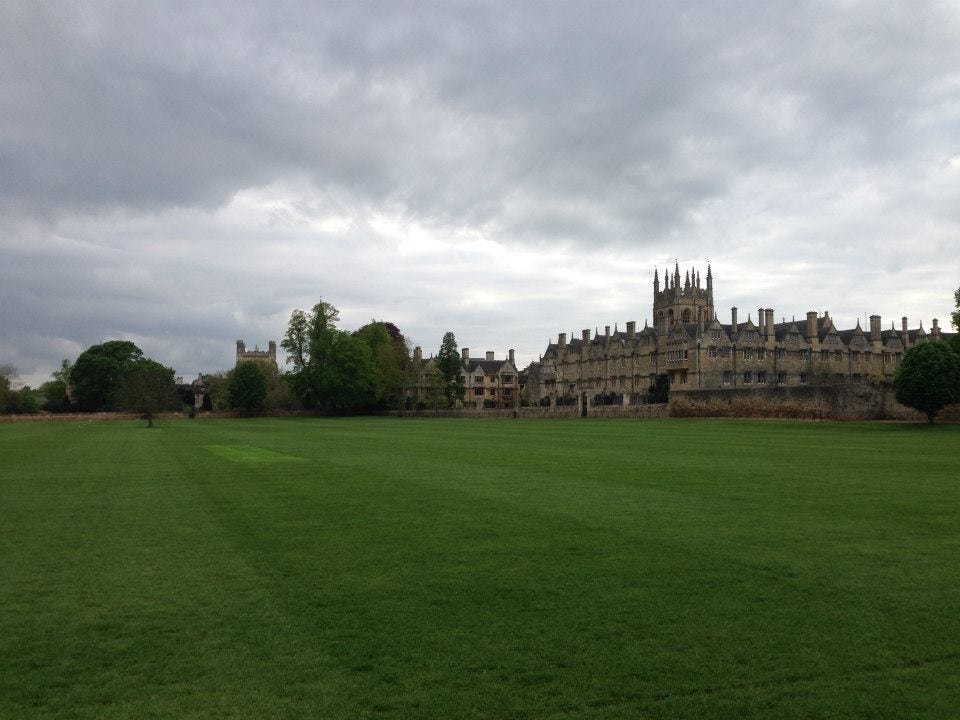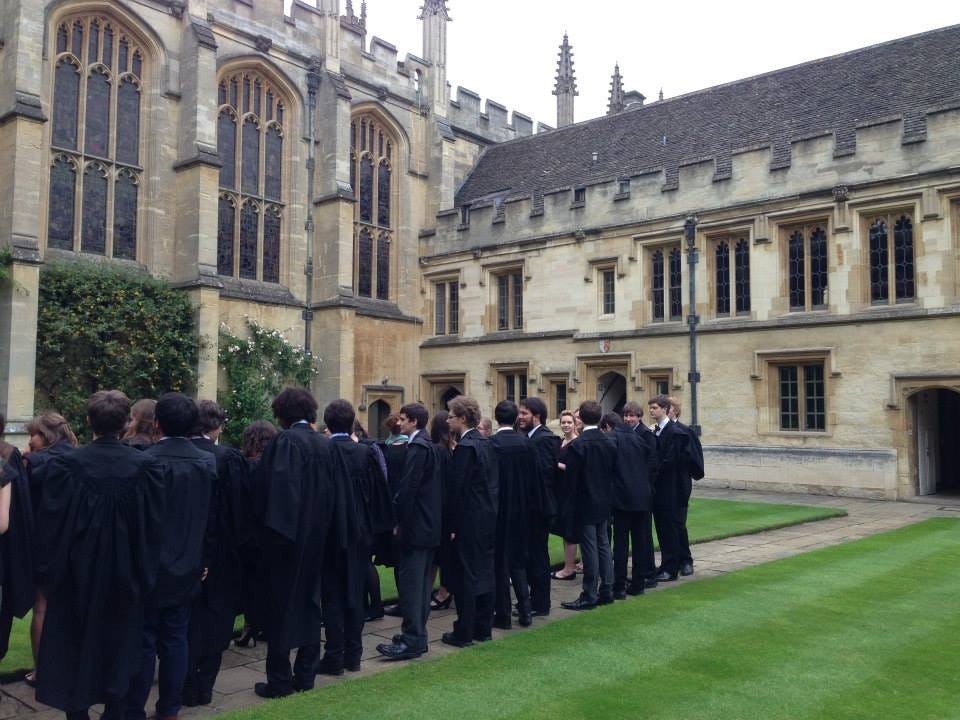Humble
MISERABILIS IN ANGLIA
I went to graduate school at Oxford. I had never visited before I attended, but of course I had all kinds of dreams about it. When I received the letter telling me I had been admitted, it was so strangely worded that I wasn’t sure if I had actually gotten in. There were no congratulations. My graduate application had merely met “a commendable standard.” I read the letter six times. Then I cried.
When I “went up,” as they say, I was twenty-two, and I was trying very hard to convince myself that I was so obsessed with ancient Greek and Roman art that I was prepared to dedicate my young life to its study. If all went according to plan, I would spend the next decade trying to say something original about ancient sculpture, a subject that had been studied since antiquity itself. I would need to master five languages. Unfortunately for me, my six years of Latin revealed little talent or enjoyment of the subject, and while I was barely competent in conversational Italian and French—I probably had the comprehension of a five-year-old, and leaned heavily on my “Blonde American College Girl” persona whenever I got stuck—I would need to read serious scholarship. And then there was the albatross: German and ancient Greek, both of which I was too afraid to touch.
It’s clear to me now, in my thirties, that what I really enjoyed about the whole ordeal was poking around in libraries and museums, talking about “ideas,” gazing at marble statues, living what I considered at the time to be a “European Lifestyle,” having pithy little opinions about art, and, obviously, writing. Dull conferences where the PowerPoint isn’t working and no one can find the dongle, dingy, windowless offices, toiling in total obscurity, crushing loneliness, and the pressure to publish or perish were simply not on the mood board. Call me naive, but I didn’t think graduate study meant feigning rapt interest during doctoral thesis presentations with titles like Anatolian Loom Weights: A Feminist History.
My time there humbled me. And I don’t mean that in the way people use the word “humbled” these days, which is what they say when they actually mean “grateful.” (E.g.,“I am so humbled to receive this award.”) I’m grateful for the experience too, of course, but here I mean humbled in the real way: lowered in importance, defeated, made to reconsider myself and my place in the world. For most of my degree, I was very depressed, very lonely, and was made to feel very stupid. And frankly, I probably needed that. I needed to learn to appreciate the little things in my life. Like the sun.
Graduate school is often mocked for its expense and lack of employment opportunities. Yes, fine, good, we’ve all heard that before. But no one told me so-called “dark academia vibes” came with even darker thoughts. Though much of modern life has been reduced to its aesthetics—on TikTok, the word “aesthetic” is used, abused, and pronounced incorrectly what feels like ninety-five percent of the time—it’s worth looking past the fantasy of the fountain pen and thinking hard about what you might have to write with it. The ivory tower shimmers with promise and possibility, but often the inside is dimly lit and dirty.
Mere months before my arrival, I was a college senior, tanning on the roof and drinking bagged wine in fraternity basements at UC Berkeley. I was completely unprepared for my cold and lonely life in Jolly Old England. (Perhaps I should have listened to one of my graduate student instructors—or “GSIs,” as we called them—who hosted an unofficial Q&A with the title: So You Think You Want to Go to Grad School. At that meeting, he sat us down and told us how few jobs there were and how little money he made. “If you can picture yourself doing literally anything else,” he said, with the seriousness of an oncologist, “I encourage you to do that instead.” We all ignored him, of course. He wore a three-piece suit and a pocket square every day—in California. What did he know.)
My course started in October. I arrived a few weeks before everyone else at my college because I went on a Eurotrip with my best friend in August, and it didn’t make financial sense to fly home to California before term began. I figured I’d spend a few weeks getting my bearings and making friends. Neither happened. I moved through the city like a ghost, completely unnoticed, even to myself. Basically, I ate McDonald’s a lot and struggled to adjust to the time difference. Once I fell asleep in my college’s graduate common room, on the couch, with my hand in a bag of large fries. The college porter found me like that, and there was nothing I could say. We just looked at each other and laughed. “Do you love it?” my friends back home asked. “Is it like Harry Potter?”
I lied and said it was great. But no, I didn’t. And no, it was not.
When term started, I was relieved to learn that there were indeed other students at the University, and I even met some of them. I got a 73 on my first paper. I thought I’d received a bad grade, the equivalent of a C-minus, but my British housemate told me that a 73 was absolutely brilliant, and to my surprise, after checking the University website, it was indeed First Class. I was extremely proud of myself, though unfortunately, this paper would be the highlight of my postgraduate career. From then on, I went on to receive lower and lower marks. My grades were something like the British winter sun: never that high to begin with, sinking lower and lower, into a kind of haze, until it was pitch black at 4pm, the terror set in, and I was forced to realize: maybe academia isn’t for me. (For the record: I did pass, in the end. Even the viva voce exam where you go into a room dressed in your robes, sit in a wooden chair, and several academics in your field grill you with unanswerable questions for as long as they like.)
My advisor was a nebbish Englishman who held a plum position in the art history department. Pigeon-toed, red in the face, soft around the middle, balding—but retaining a certain innocence. Once, in an atypical fit of spitting rage, he called me a Marxist because I argued—quoting my paper here—that “the British aristocracy not only dehumanized the workers in their own industrial plants and foreign colonies, they also objectified the products of these cultures, like classical sculpture, as their own kind of decorative, personal playthings.” I’m not a Marxist, but I stand by it.
I remember almost crying as he hurled this and other insults at me. I couldn’t look him in the eye, so I looked down and examined his trash can. It contained the Pret A Manger wrappers from his lunch that day: an egg salad sandwich, a banana peel, a chocolate cookie. A meal of balanced sadness. From that day on, I always looked in his trash during our tutorials to see what he had had for lunch. It was always from Pret, and it always depressed me. (Around mid-November, he discovered Pret’s warm chicken wrap, and a sort of love affair began. He ate one every week—and I can only assume every day—for the rest of term.) Seeing his trash each week, and picturing him eating his lunch alone at his desk gradually made me lose so much respect for him that my feelings transformed into a kind of tender protectiveness. I still remember him fondly, after all these years.
Anyway, every week, this very sad man would hand me a single sheet of paper, which was my weekly assignment. The page was mostly blank, but contained a type-written, cryptic question—e.g., “Why did the statue habit come to an end?”—and, if I was lucky, a few books and articles to get me started. Of course, these sources were never complete, often cryptic themselves, and never had relevant page numbers. “Is there a specific chapter in this book you’d like me to read?” I once asked. His face twisted at the absurdity of such a question. “Do you want me to do the work for you?” he replied. The sources provided were also, notably, not always in English, never mind the fact that English was the only language I could read. De Grummond 1974, Zwierlein-Diehl, Antike Gemmen und ihr Nachleben, C.M. Brown*. (What did the asterisk mean? I didn’t dare ask.)
“Alright. Off you go!” he would say, waving me out of his office like a bad smell.
For three days, I navigated a labyrinth of underground tunnels and libraries, looking for these books, the books referenced by these books, basically any clues I could find, skimming like my life depended on it. I would usually gather an average of twenty books and articles each week, scan the shorter pieces to a thumb drive, two pages at a time—the University actually charged us a small fee per page to do this—and carry the rest home. Then, over the following three days, I would attempt to turn my findings into a 25-page academic paper, subsisting entirely on coffee, tea, and what I’ll call “toast-based meals.” After I turned in the paper, I would go to the pub with some friends, but I could never get too drunk because the next day I would have to discuss the paper for two hours with The Nebbish Englishman, who, between blank stares and slow blinks would ask me questions like, “Why on earth would you use the word thus in this sentence?” When he listened, he would tent his fingers and press them up against his lips, remaining motionless when he could tell I was bullshitting him (which was pretty often), and tapping them a few times, his eyes darting around the room, if I managed to make any kind of good point. At the end of the meeting, he would hand me a new piece of paper, and the cycle would begin again.
Sometimes, another graduate student would join these meetings, and we would endure joint insults like: “If I put the two of you together, maybe then I’d have an answer. Catherine, you have too many ideas. [Redacted], you have none. But at least you did all the reading.” After our tutorials, we would go get a falafel sandwich together and quote him like he was our favorite character on a television show. She was also American, and I hoped to find some common ground with her. Once I bumped into her on the library stairs, and we somehow found ourselves discussing a topic core to our shared American culture: firearms. I learned, to my total surprise, that she had a concealed carry permit back home. A gentle inquiry revealed that she stored her guns the same way I scattered tubes of Chapstick: one in her house, one in her car, one in her purse. When I expressed surprise that a twenty-two-year-old woman would own at least three handguns, she looked at me like I was the crazy one. What can I say. People’s lives are a mystery.
I had a boyfriend back home at the time, but it wasn’t like the local prospects were all that tempting. Compared to the American fraternity boys I was used to, who essentially majored in shooting their shot, the postgraduate British men I met struck me as self-serious, awkward, and unsociable. (The Welsh and the Irish were more my speed.) I recall eating dinner at Formal Hall, and a man sitting near me, in an attempt at flirting said, in a posh British accent, “You know, when you think about it, the fork really is the best tool to get food to the mouth.”
The house where I lived was nestled on a tiny alleyway next to a nice hotel. Every morning around 5am, the “bin men” would come to gather the recycling, their truck beeping as it backed up the whole way down the street. From there, they would apparently try to smash as many bottles as they could, as loudly as possible. I would wake up with a fright every morning when this happened—it was the loudest noise imaginable—and instinctively kick the foot of my twin-size bed. During the day, I wish I could say I wrote in peace, but our alley was used as a shortcut by large groups of rowdy Spanish teens, every half hour or so, for guided walking tours of campus. At night, drunk male undergraduates used it as a place to piss and vomit. Drunk female undergraduates used it as a place to have crying meltdowns about the male undergraduates. In short, it was bedlam.
When it started getting dark at three or four in the afternoon, I would sit in front of my Seasonal Affective Disorder lamp for a few hours while working on my papers. (The acronym for this ailment is literally “SAD.” Life is full of wonderful jokes like this if you look for them.) Photographs of my friends and family in sunny California were tacked up on the walls. Once, to my deep embarrassment, I overheard one of my housemates say to another, with grave concern, that “Catherine is sitting in front of her lamp again.” Some of my housemates were lovely. Others were the strangest people I’ve ever met, like the guy who toasted his bread the night before.
For the first time in my life, I spent Thanksgiving alone. For my Thanksgiving dinner, through tears, I choked down a dry burrito from a local shop, and then Skyped with my parents. That fall, my hair grew long, frizzy—and to my horror—a color darker than platinum blonde. My acne turned cystic. It was November, then December. By January, a third of the people in my course had dropped out. By the time I completed my degree, only half of us remained.
I’m going to be honest: I went a bit mad at one point. For reasons I still cannot explain, I thought embroidery of all things would save me. I spent hours watching embroidery tutorials on YouTube and researching techniques and tools. I attempted to catalogue every quote I loved from everything I’d ever read. I made a daily health checklist to cover the basics. Did I eat three meals that day? Did I go outside? When was the last time I took a shower? In February, I wrote in my diary: “I wish I knew the direction I want to move. Just knowing that would probably make things so much easier for me. I just want a sign that it will all work out in the end.”
I grew to hate what I can only call the Britishness of it all. The “fire door keep shut” signs on every interior door. CCTV. The separate hot and cold water taps. The stuffy pomp and circumstance. Shopkeepers and cashiers shrieking, “Can I help?!” Everyone trying to be so clever all the time. The food. The fact that the Brits call orange juice “orange squash.” The constant, fizzy rain. When term began, I carried an umbrella with me everywhere. By the end, I didn’t care enough. I just let myself get wet.
Things shifted for me around March, when I discovered sticky toffee pudding and started running again. I ran through the colleges and around Christ Church meadow, for an hour at a time, sporting a white t-shirt I ordered specifically for this purpose, emblazoned with the letters “U.S.A.” I had come to the same conclusion as my ancestors, and I was determined to advertise it. I missed home so much. I missed my family. I missed the sun. I didn’t really miss my boyfriend. When the sun finally came out that spring, it felt like my dinner date was an hour late. Why did you even bother showing up, I recall thinking.
I’d be lying if I said a part of me didn’t love it—all of it. It’s true what they say: the worst times make the best memories. I still go back to visit any chance I get because I survived it in the end, I got my bearings, and I made some friends. Whenever I return for a visit, I book a room at the nice hotel near where I used to live. I don’t hear the smashing bottles. I order a full English breakfast and a cup of tea. It doesn’t feel like the place it was. It feels like the place I always wanted it to be.








Brilliant essay! But orange squash and orange juice are different things! We definitely don't call orange juice, orange squash!
Starting graduate school this Fall (in sunny California) and this piece thoroughly entertained/inspired me. Thank you, Catherine!